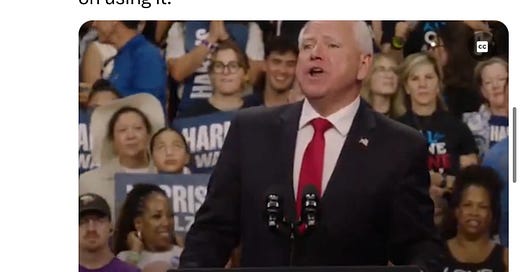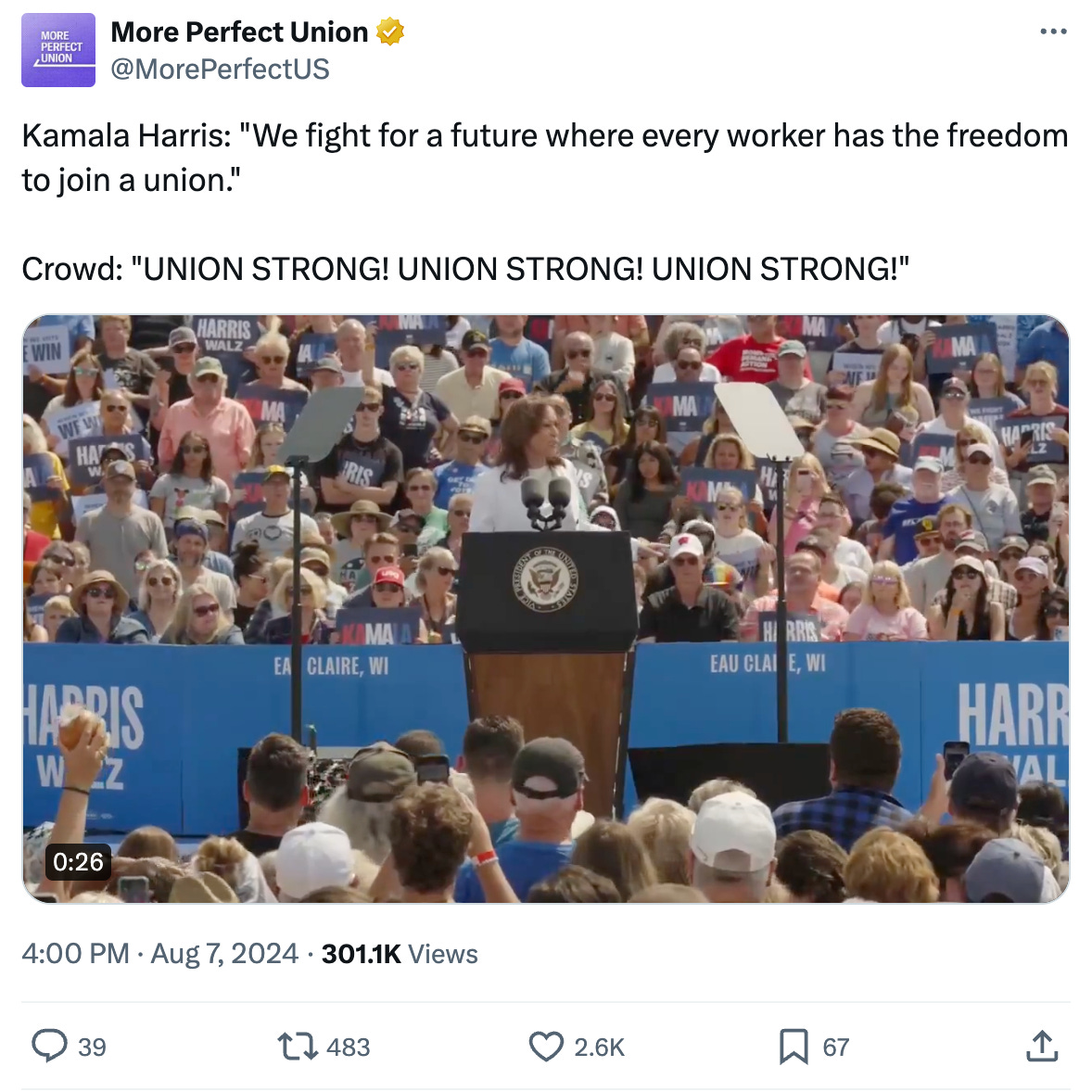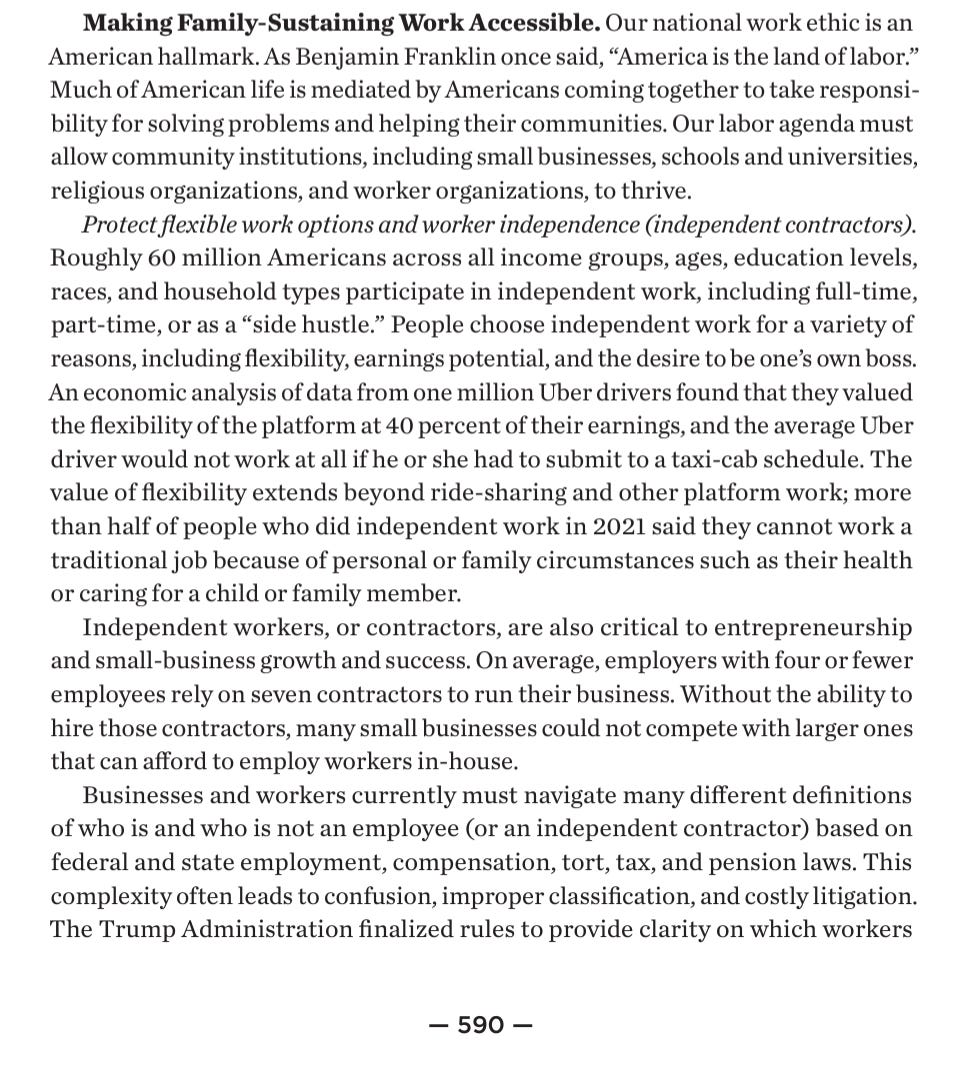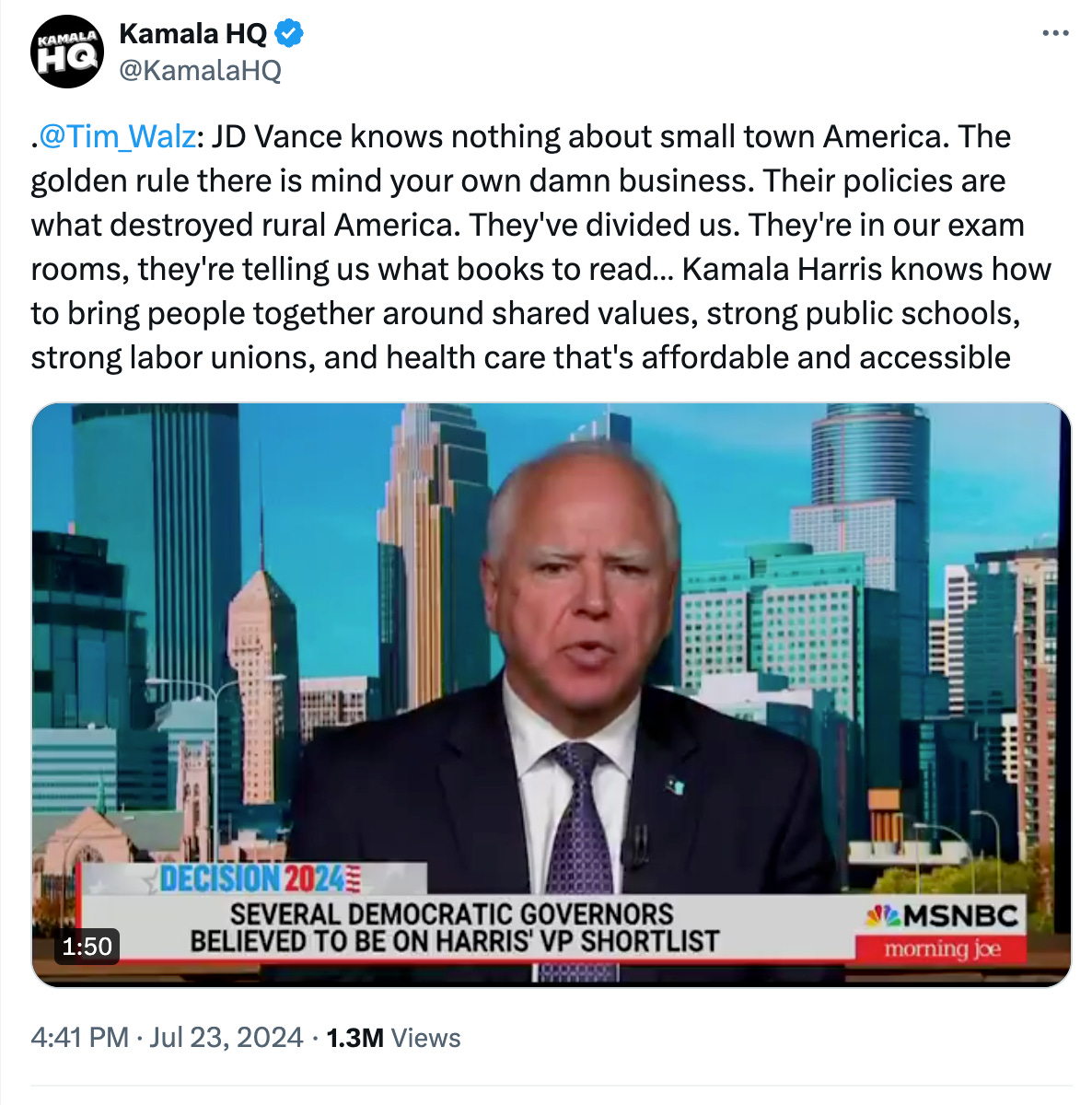Listen to Tim Walz
He says that when somebody makes a playbook, they plan to use it. So, for your consideration, here are the candidates' independent-contractor playbooks (and Project 2025, too).
Minnesota Governor Tim Walz, newly minted as the Democratic Party’s candidate for vice president, is mincing no words about how we all should be thinking heading into this fall’s election:
Governor Walz is right about that.
When somebody draws up a playbook, they plan on using it.
This year, we have four elected officials at the top of the Democratic and Republican tickets—which means that we can see not only the playbooks they’re promising us going forward, but also the plays they’ve run in the past regarding our right to choose self-employment.
Here’s a look at the major party candidates and the playbooks for how they plan to approach the independent-contractor policy issue.
The Democratic Ticket
Following on the heels of the Biden-Harris administration—whose freelance-busting stance has been relentless—the Democratic Party platform calls for increased funding to “aggressively enforce” Biden-Harris policies like the new rule at the U.S. Department of Labor that is facing numerous lawsuits from independent contractors (including this one, in which I’m a plaintiff).
The party platform also clearly states the intent to use the ABC Test to determine employee status. This overly restrictive test has proved an unmitigated disaster for legitimate independent contractors in hundreds of professions in California, ever since it went into effect in January 2020 as the heart of Assembly Bill 5.
The Democratic Party platform also calls gig and platform workers misclassified employees, even though most of these people—in private and industry studies alike—repeatedly say see themselves as, and/or wish to remain, independent contractors.
Kamala Harris
Vice President Harris, since becoming the presumptive Democratic Party nominee for president, has continued to signal strong support for the widespread reclassification of independent contractors into unionizable employee status. This position, too, defies the will of the vast majority of independent contractors, according to government and private research.
Just days after President Biden dropped out of the race, Harris reiterated the crowd-pleasing line that she uses to make her freelance-busting position clear:
“We believe in a future … where every worker has the freedom to join a union.”
She has been repeating this line on the campaign trail, where she encourages chants of “union strong” from the crowds:
It’s important to understand that every American already has the freedom to choose a traditional job and join a union.
Our laws also allow us the freedom to choose self-employment. Independent contractors are protected from union organizers in this case.
When Harris says she wants everyone to have the “freedom” to join a union, what she actually means is giving union organizers the ability to target independent contractors—efforts that, in recent years, have proved broadly unpopular.
Tim Walz
Governor Walz’s first solo campaign appearance this week was before the AFSCME union. There, he followed Harris’ lead and described the federal Protecting the Right to Organize Act as legislation that would give “people the freedom to make a choice” to join a union. (Skip to 14:45 on the video for Walz’s PRO Act remarks.)
The PRO Act contains the ABC Test. Similar to what happened in California, it would redefine tens of millions of self-employed Americans nationwide as unionizable employees. A former chairman of the National Labor Relations Board wrote about the predicted outcome:
“This is not a mere technical redefinition: it would substantially unravel and change large segments of the US economy and adversely affect millions of service providers who currently view themselves as independent contractors governed by their own entrepreneurial decisions.”
As the evidence from California’s test run of this ABC Test shows, the primary result of this change is to destroy independent contractors’ income and chosen careers.
Walz, as governor of Minnesota, has moved in this same policy direction, signing statewide legislation that makes it riskier for companies to work with independent contractors. Most recently, this summer, there was this news:
“Gov. Tim Walz, D, has signed into law significant changes to Minnesota’s independent contractor and employment laws. Effective July 1, all employers, as well as their owners, risk significantly increased penalties for misclassifying employees as independent contractors.”
Walz also left the door open to reclassifying app-based drivers as employees. As the StarTribune reported:
“Advocates celebrated a law that sets pay minimums for Uber and Lyft drivers and provides the drivers with new insurance provisions, but does not lock drivers into independent-contractor status…”
Also during Walz’s administration, Minnesota’s attorney general created a Task Force on Misclassification. This task force includes just one independent contractor (who is a member of the grassroots group I co-founded, Fight For Freelancers). By contrast, the task force also includes multiple union representatives, from the AFL-CIO, LIUNA and the North Central States Regional Council of Carpenters.
In recent months, this task force has discussed California’s freelance-busting ABC Test. Most of the state’s small businesses and independent contractors oppose the policy, according to a 2023 NFIB Minnesota member survey.
The Republican Ticket
The Republican Party platform does not specify policy with regard to independent contractors.
It does state: “Republicans will slash Regulations that stifle Jobs, Freedom, Innovation and make everything more expensive. We will implement Transparency and Common Sense in rulemaking.”
In theory, that suggests that a second Trump administration would revert to the rule that his labor secretary put in place during his first administration, to try and protect independent contractors from California-style freelance busting.
Donald J. Trump
During his time in the White House, Trump drew the ire of unions for threatening to veto the PRO Act.
In addition, his labor secretary, Eugene Scalia, was clear about the administration’s goals in rulemaking with regard to independent contractors, and how it was different from the California approach:
“The final rule the Department issued Wednesday preserves independent contractor status under the [Fair Labor Standards Act}, so that the many Americans who prefer being in business for themselves can continue to do so. … Critically, our rule doesn’t re-draw boundaries to reclassify many more workers as employees, as AB-5 did. We respect the interest that millions of Americans have in being their own boss.”
Unions that have been vocal supporters of freelance busting and the PRO Act, including the AFL-CIO, SEIU and UAW, have all come out strongly against the Trump-Vance ticket. The UAW, just this week, filed an unfair labor practice against Trump and stated: “When we say Trump stands against everything our union stands for, this is what we mean.”
Notably, the Teamsters union is different. Trump invited its leader, Sean O’Brien—one of the loudest freelance-busting unionists in the country—to speak at the Republican National Convention. On stage, O’Brien repeated common freelance-busting talking points.
JD Vance
As a sitting senator in Ohio, JD Vance has taken several positions that suggest he supports freelance busting, including new ways of attempting to achieve it.
Senator Vance did not support the PRO Act, but his reason was different from Republicans and moderate Democrats who said they blocked the bill because they wanted to protect independent contractors.
As Politico reported:
“When I asked Vance why he opposes the bill, he pointed to two considerations, one practical and one political. The practical consideration, he told me, is that the PRO Act would effectively codify the U.S.’ current system of collective bargaining — in which contracts are negotiated between workers and their individual employers — whereas he’d like to see the U.S. move toward the sectoral model used in Europe, where contracts are negotiated to cover entire industries. (Pro-labor advocates on the left have argued that the PRO Act could serve as a bridge to more sweeping reforms to America’s collective bargaining system.)”
The sectoral model of organizing involves letting unions set standards for entire industries, compared to America’s current system of unions negotiating with individual workplaces. Sectoral organizing would be a way for unions to affect independent contractors without changing our status to employees.
Ushering in this new type of union organizing is currently a priority of the SEIU, which is spending $200 million to try and swing the election for Democrats.
Related to that type of campaign spending, Vance also told Politico that his support for politically active unions comes with caveats:
“‘We can’t just be good, we have to be smart,’ he told me, ‘and I think it’s dumb to hand over a lot of power to a union leadership that is aggressively anti-Republican.’
Vance’s skepticism of the PRO Act is part of a more fundamental skepticism that he harbors toward organized labor. In a speech at a Claremont Institute event in December, Vance said that conservatives ‘need to be honest about the fact’ that there are ‘good unions’ that Republicans should support and ‘bad unions’ that they should oppose. As an example of the former, he cited the Fraternal Order of Police; as an example of the latter, he cited the Starbucks baristas union.
‘If your politics lead you to defend the baristas union as they defend Hamas, then you should have a different politics,’ he said. ‘It’s really that simple.’”
Separate from the PRO Act in Congress, Senator Vance was among a handful of Republicans who failed to support use of the Congressional Review Act to protect independent contractors from the Biden-Harris administration’s independent-contractor rule change.
Project 2025
Given all the media attention that Project 2025 has received, it’s worth noting what it states about independent contractors.
Trump disavowed this conservative policy agenda, while the Democrats continue to tie him to it. Vance wrote the forward to a forthcoming book by a key Project 2025 architect, but also said he “has plenty of disagreements with what they’re calling for.”
Neither Trump nor Vance has commented about what Project 2025 says specifically with regard to independent contractors.
On pages 590 and 591, Project 2025 states that government should protect the right to choose self-employment, including solidifying that right with an act of Congress:
That last bit would mean that if independent contractors’ clients wish to offer access to benefits such as health insurance, then those clients should be allowed to do so without risking government penalties for employee misclassification.
Mind Your Own Damn Business
One of Walz’s biggest applause lines so far on the campaign trail has been “mind your own damn business”:
I’m one among the tens of millions of Americans who are trying hard to mind our own businesses as independent contractors. We generate more than a trillion dollars for the economy. We are projected to comprise more than half the U.S. workforce by 2027.
Quite frankly, it should be a political no-brainer for every lawmaker, in every party, to support and protect our right to choose how we earn a living.
Harris, Trump, Walz and Vance are asking all of us to advance their careers.
They should be willing to protect our careers in exchange for that privilege.










Update on the afternoon of August 19, based on the revised Democratic Party platform that's now online: The party appears to have removed the reference to the ABC Test. The updated platform states: "We’re making it harder for employers to misclassify workers as independent contractors to avoid paying them full pay and benefits."